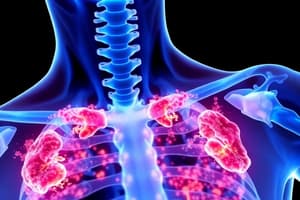Podcast
Questions and Answers
What is the most likely cause of the woman's hypercalcemia?
What is the most likely cause of the woman's hypercalcemia?
- Primary hypoparathyroidism
- Osteomalacia
- Secondary hypoparathyroidism
- Paget's disease of the bone
- Malignancy (correct)
What is the characteristic PTH level in hypercalcemia secondary to malignancy?
What is the characteristic PTH level in hypercalcemia secondary to malignancy?
Low
Osteomalacia is caused by vitamin D deficiency.
Osteomalacia is caused by vitamin D deficiency.
True (A)
What is a key investigation for patients with hypercalcemia?
What is a key investigation for patients with hypercalcemia?
In Paget's disease of the bone, blood tests commonly show a normal calcium level.
In Paget's disease of the bone, blood tests commonly show a normal calcium level.
What may cause hypercalcemia due to malignancy?
What may cause hypercalcemia due to malignancy?
Flashcards are hidden until you start studying
Study Notes
Hypercalcemia
- Hypercalcemia is a condition where the blood calcium levels are higher than normal.
- Two main causes of hypercalcemia account for 90% of cases.
- Primary hyperparathyroidism: most common in non-hospitalized patients. This occurs when the parathyroid glands produce too much parathyroid hormone (PTH), leading to increased calcium levels.
- Malignancy: most common cause in hospitalized patients. This can happen in a variety of ways:
- PTH-related protein (PTHrP) production: Tumor cells produce a protein similar to PTH, causing increased calcium levels even with low PTH. - Bone metastases: Cancer cells can spread to the bones, releasing calcium into the bloodstream. - Myeloma: Cancer cells affecting bone marrow can stimulate bone breakdown, leading to increased calcium.
- In hypercalcemia secondary to malignancy, PTH levels are usually low, but PTHrP may be elevated.
- Determining the cause of hypercalcemia is crucial for proper treatment.
Investigations
- Measuring parathyroid hormone (PTH) levels is a key investigation for patients with hypercalcemia.
- Other relevant blood tests include magnesium, bilirubin, alkaline phosphatase (ALP), alanine aminotransferase (ALT), gamma-glutamyl transferase (GGT), albumin, and calcium levels.
- PTHrP requires a separate test.
Other causes of hypercalcemia
- Sarcoidosis: This inflammatory disease can cause granulomas that increase calcium absorption from the gut.
- Other granulomatous diseases, such as tuberculosis and histoplasmosis, can also contribute to hypercalcemia.
- Vitamin D intoxication: Excess vitamin D can lead to increased calcium absorption from the gut.
- Acromegaly: Excess growth hormone from the pituitary gland can stimulate bone turnover and increase calcium levels.
- Thyrotoxicosis: An overactive thyroid gland can increase bone resorption and calcium release.
- Milk-alkali syndrome: Excessive intake of calcium and alkali, often associated with high milk consumption, can cause hypercalcemia.
- Drugs:
- Thiazide diuretics can decrease calcium excretion by the kidneys.
- Calcium-containing antacids can increase calcium levels.
- Dehydration: Decreased fluid volume can raise calcium levels.
- Addison's disease: This condition causes adrenal insufficiency, which can lead to hypercalcemia.
- Paget's disease: Even though calcium is usually normal in Paget's disease, prolonged immobilization can lead to hypercalcemia.
Studying That Suits You
Use AI to generate personalized quizzes and flashcards to suit your learning preferences.




